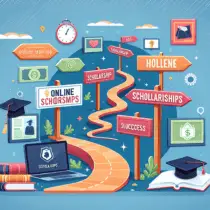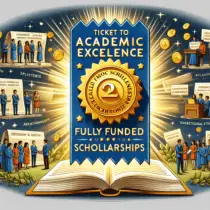Paving the Path to Success: Exploring Scholarships for Online Learners
In today’s digital age, online learning has emerged as a popular and flexible option for individuals seeking to further their education. With the convenience of studying from anywhere and at any time, online education has opened doors to countless opportunities. However, the financial aspect can pose a significant challenge for many prospective students. Fortunately, scholarships specifically designed for online learners have become increasingly available, easing the burden of tuition fees and allowing students to focus on their studies without financial worries.
Whether you are a working professional looking to advance your career or someone who desires to pursue higher education but is unable to attend a traditional brick-and-mortar institution, there are various scholarships tailored to support your online learning journey. This article aims to explore the diverse range of scholarships available for online learners, providing valuable information and resources to pave your path towards success.
Types of Scholarships for Online Learners
1. Merit-Based Scholarships: These scholarships are awarded based on academic excellence, extracurricular achievements, leadership qualities, or other notable accomplishments. Institutions offering online programs often provide merit-based scholarships to attract high-achieving students.
2. Need-Based Scholarships: Designed for students with demonstrated financial need, these scholarships consider factors such as household income and expenses. Online learners experiencing financial hardships can benefit from need-based scholarships that help alleviate their tuition burden.
3. Diversity Scholarships: Supporting inclusivity and diversity in higher education, these scholarships aim to assist underrepresented groups by providing financial aid specifically tailored towards them. These may include minority groups, women in STEM fields, individuals with disabilities, or veterans.
4. Field-Specific Scholarships: Many organizations and foundations offer scholarships for students pursuing education in specific fields such as science, technology, engineering, mathematics (STEM), business, healthcare, or the arts. Online learners can find scholarships that align with their chosen field of study.
5. Employer Scholarships: Some employers recognize the value of continuous education and offer scholarships to their employees who wish to pursue online courses or degrees. Researching if your employer provides such opportunities can be advantageous.
Sources of Scholarships for Online Learners
1. Colleges and Universities: Many online institutions have their own scholarship programs to support their students financially. These scholarships may range from partial tuition coverage to full-ride scholarships.
2. Private Organizations: Numerous private organizations and foundations are dedicated to promoting education and offer scholarships specifically targeted towards online learners. These organizations often have different eligibility criteria, application processes, and scholarship amounts.
3. Government Aid: Federal, state, and local governments provide financial aid options for students pursuing both traditional and online education. By completing the Free Application for Federal Student Aid (FAFSA), online learners may become eligible for grants, loans, or work-study opportunities.
4. Professional Associations: Many professional associations provide scholarships to individuals pursuing online education in their respective fields. These scholarships often require membership in the association but can provide valuable networking opportunities as well.
5. Philanthropic Foundations: Charitable foundations and philanthropic organizations contribute significantly to higher education by offering scholarships to support students’ educational journeys. Exploring these foundations can lead to an array of scholarship opportunities.
Tips for Applying to Scholarships
1. Start Early: Begin searching for scholarships well in advance to ensure you don’t miss any deadlines. Many scholarships have limited funds and early applicants often have a higher chance of success.
2. Research Eligibility Criteria: Read the requirements thoroughly to determine if you meet the criteria before investing time in the application process. Focus on scholarships that align with your background, field of study, or personal circumstances.
3. Gather Required Documents: Prepare all necessary documents, such as academic transcripts, recommendation letters, and personal statements, well in advance to avoid last-minute rush and ensure your application is complete.
4. Tailor Your Applications: Customize your scholarship applications to highlight your unique accomplishments, experiences, and aspirations. Show how you would contribute positively to the field of study or community if awarded the scholarship.
5. Seek Assistance: Reach out to college advisors, mentor figures, or career centers for guidance throughout the scholarship application process. They can provide valuable insights and help polish your applications.
Frequently Asked Questions about Scholarships for Online Learners
1. Can online learners receive the same scholarships as traditional students?
Absolutely! Online learners are eligible for many of the same scholarships available to traditional students. However, there are also scholarships specifically designed for online education.
2. Are online scholarships only available from private sources?
No, online learners can access scholarships from various sources including colleges/universities, governments, professional associations, and philanthropic foundations.
3. Do I need to be enrolled in a full-time online program to be eligible for scholarships?
No, scholarship opportunities exist for both full-time and part-time online learners. Be sure to check the specific eligibility requirements outlined by each scholarship provider.
4. Can I apply for multiple scholarships at the same time?
Absolutely! It is highly encouraged to apply for multiple scholarships to increase your chances of being awarded financial assistance. However, keep track of individual application deadlines and requirements.
5. How competitive are online scholarships?
The competitiveness of online scholarships can vary depending on the specific scholarship, its criteria, funding availability, and the number of applicants. To improve your chances, focus on aligning your strengths with each scholarship’s requirements.






